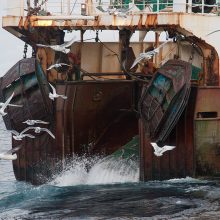The 36th Annual Meeting of the Northwest Atlantic Fisheries Organization (NAFO) convenes this week (September 22-26) in Vigo, Spain. Of primary concern to conservation organizations is the protection of deep sea species from bottom trawling. While some areas of the deep-sea in the Northwest Atlantic have been closed to fishing over the past several years, scientific advice presented this year indicates that there is poor protection in several areas including deep sea corals, sponges and seamounts as well as other fragile sea floor species.
“Each year, NAFO has made progress in protecting vulnerable species,” says Katie Schleit, Marine Campaign Coordinator at the Halifax based Ecology Action Centre and observer at this year’s meeting. “However, large areas remain open to fishing activity despite the fact that scientists have identified concentrations of fragile species.”
In 2015, the United Nations General Assembly (UNGA) will review the actions of all Regional Fisheries Management Organizations (RFMOs) responsible for management of straddling stocks and the protection of vulnerable marine ecosystems on the high seas (outside of the 200 mile limit). Commitments have been made at the UNGA since 2006 to protect fragile species on the high seas from the impacts of destructive fishing practices.
“Deep sea ecosystems do not recover quickly, if at all, from the impacts of bottom trawling. We know that this is the single greatest threat to fragile and vulnerable ecosystems that have taken millenia to develop, “says Dr. Susanna Fuller, board member of the Deep Sea Conservation Coalition. “This year, NAFO must agree to permanent closure of existing closed areas, and commit to closing new areas, including all seamounts, where vulnerable marine ecosystems are known or likely to occur.”
“If countries cannot agree to further closures, as well as improved data collection, it would appear that there is a lack of commitment to work through existing management organizations to ensure protection of deep sea stocks and seafloor biodiversity,” says Schleit. “They have the tools at their fingertips, they have the science and the policy framework – what often is lacking is political will.”
NAFO has made significant improvements in transparency in allowing non-government organizations to observe all of its meetings. The commitment to address bycatch as well as stock rebulding are also welcome measures agreed at the 2014 Annual Meeting. NAFO has closed 13 areas to bottom trawling as of 2014.
****************************
The Ecology Action Centre and Deep Sea Conservation Recommendations for the 36th Annual Meeting of NAFO are available here: http://www.savethehighseas.org/publications/.
For further information contact:
Katie Schleit, Marine Campaign Coordinator, Ecology Action Centre p: +34 691 701876 kschleit@ecologyaction.ca www.ecologyaction.ca
Susanna D. Fuller, PhD., Deep Sea Conservation Coalition p: 011 902-483-5033
e:marine@ecologyaction.ca www.savethehighseas.org
The Ecology Action Centre was founded in 1971 and works on a wide variety of environmental issues in Nova Scotia and Canada through education, research and advocacy. EAC has been involved in sustainable fisheries work since the cod collapse in 1992. www.EcologyAction.ca
The Deep Sea Conservation Coalition was founded in 2004 to address the issue of bottom trawling on the high seas in the absence of an effective governance regime. The coalition is made up of more than 70 NGOs, fisher organizations, and law and policy institutes committed to protecting the deep sea. A coordination team works together with a Steering Group that consists of Ecology Action Centre, Greenpeace International, Marine Conservation Institute, Natural Resources Defense Council, Pew Charitable Trusts and Seas At Risk. www.SavetheHighSeas.org

